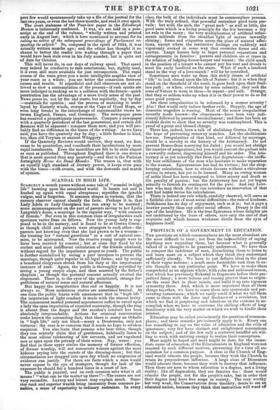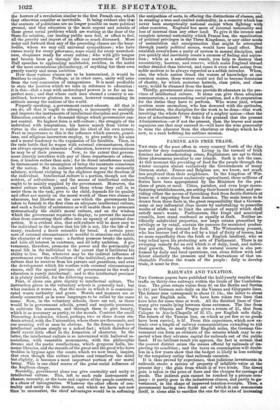PROVINCE OF A GOVERNMENT IN EDUCATION. Tun questions on which
commonplaces are tie most abundant are the most difficult to treat ; not from the impossibility of saying anything new regarding them, but because 'what is generally talked of is thought to be generally understood. We have thus to conquer the indolence of men, disinclining them to listen to and learn more on a subject which they think they understand sufficiently already. We have to put definite ideas in the place of their vague notions; a much more formidable task than to ex- cite thought on any particular point. We have to make them comprehend as an organic whole, with calm and unbiassed reason, that which has previously flickered in fragments before their pre- judiced fancy ; a more tedious and teasing process than to origin- ate the same fact in their minds, and build it up into vigorous symmetry there. And, which is more important than all these things together, we have to rouse them into systematic and per- severing earnestness ; which we easily could if what we tell them came to them with the force and freshness of a revelation, but which we find it perplexing and laborious in the extreme to ac- complish when we have to overcome the chilling effects of long familiarity with the very matter on which we wish to kindle their interest.
Education may be called preeminently the question of common- places ; and these remarks preeminently apply to it. Every one has something to say on the value of education and the evils of ignorance; very few have distinct and enlightened conceptions on the subject ; and of the few only a scattered handful are wil- ling to work with untiring energy to realize their conceptions.
More might be hoped and more might be dope for the imme- diate cause of education, if the Educationists in England were not inspired by such different motives, preventing for a time all co- operation for a common purpose. A class in the Church of Eng- land would educate the people, because they wish the Church to retain its preponderant influence. A large class of Dissenters would educate them, because they wish to destroy that influence. Then there are men to whom education is a dogma, not a living reality; like all dogmatists, they are fanatics too : these would educate the people, not for the people's sake, but in order that their dogma may have free scope in society. The very worthy but very weak, the Conservatives from timidity, desire to see an educated nation, because they think that instruction will ward off the horrors of a revolution similar to the first French one, which they otherwise consider as inevitable. It being evident also that the contests of politicians are no longer possible on mere political ground, and that education is the most urgent and notable of those t social problems which are waiting at the door of the State f;17siolution, our leading public men feel, or affect to feel, all the gravity and import of an affair so much discussed. More noisy and forward than any of the preceding classes are the busy- bodies, whom we may call universal sympathizers ; who have curses ready for every grievance, tears ready for every wretched- ness, eloquence ready for every reform ; who with glib tongue and brazen brow go through the easy martyrdom of Exeter Hall speeches to applauding multitudes, reckless, in the midst of the most ostentatious philanthropy, of anything but their own greedy vanity and mean ambition.
How these various classes are to be harmonized, it would be fruitless to inquire. Perhaps, as in other cases, unity will arise from the very concussion of antagonisms. It is more profitable to state the position which we take in reference to education : it is this—that a man with undeveloped powers is so far an im- perfect man ; and that where such men abound a country is un- civilized, however glorious its name however commanding its attitude among the nations of the world.
Properly speaking, a government cannot educate. All that it can do, all that it ought to attempt, is incessantly to multiply and improve the instruments of intellectual discipline and growth. Education consists of a thousand things which government can- not control. Its highest form is self-culture ; the struggle of the individual with temptations, his heroic march from virtue to virtue in the endeavour to realize his ideal of his own nature. Next in importance to this is the influence which parents, guard- ians, and religious instructers employ, to give purity to his aims and a moral tendency to the expansion of his faculties. Then, in the rude battle that he wages with external circumstances, there are always energetic elements of education, however unconscious he may be of their presence. Now' to the extent that govern- ment directly interferes with any of these departments of educa- tion, it hinders rather than aids ; for its direct interference would be tantamount to its assumption of being the incarnate conscience of the nation. But its indirect interference may be eminently salutary, without violating in the slightest degree the freedom of the individual. Intellectual culture is a portion, though not the noblest, of self-culture • and the means of intellectual culture ought to be mainly supplied by the government. Moreover, the moral culture which parents, and those whom they call in to assist them in the task, give to the child, depends for its quality and effect not merely on the moral worth of these two classes of educaters, but likewise on the care which the government has taken to furnish to the first class an adequate intellectual culture, and such a facility of subsistence as will enable them to prosecute systematically the child's moral culture, and on the wisdom which the government requires to display, to prevent the second class from converting their office into an agency- of spiritual des- potism. It is evident also, that self-culture will be more easy to the individual in the degree that his life is not, like the life of so many, rendered a fierce scramble for bread. A certain pres- sure of external circumstances is needful to stimulate and unfold the character of every man : a further pressure breaks the spirit, and kills all interest in existence_, and all lofty ambition. A go- vernment, therefore' promotes the power and the pertinacity of moral life in the individual to the extent that it facilitates his ability to live. But, whatever may be the indirect influence of government over the self-culture of the individual, over the moral culture that he receives from his parents and guardians, and over the development which his warfare with external circumstances causes, still the special province of government in the work of education is purely intellectual : and to this intellectual province it is plainly entitled, for the following reasons.
First, it alone can give dignity to intellectual culture. The instruction given in the voluntary schools is generally bad; but what renders it worse is, that the mode in which it is communi- cated wants authority and grace. Morals and manners are so closely connected as in some languages to be called by the same name. Now, in the voluntary schools, there are not, as there would be in government schools, grand and majestic presences, to cultivate the manners, and through them to give beauty, which is as necessaiy as purity, to the morals. Contrast the small Dissenting Academies, where, perhaps, two or three dozen stu- dents attend, with the Universities, where there are thousands, and our meaning will at once be obvious. In the former, you have intellectual culture simply as a naked fact ; which therefore of itself exerts little effect in the formation of character. In the latter, the intellectual culture is so intermixed with hallowed as- sociations, with venerable monuments, with the philosophic dreams and the poetic recollections, which gorgeous halls, im- mense libraries, and the records of the great and the good who have trodden in bygone ages the courts which we now tread, inspire, that even though this culture inform and transform the mind but slightly, it becomes a most important portion of our moral being inns is one chief source of the great social influence of the .Anglican clergy.
Secondly, government alone can give centrality and unity to Intellectual culture. This, left to such rude instruments as chance, necessity, or the taste and caprice of the people construct, IS a chaos of incongruities. Whatever the other effects of cen- trality and unity in this matter, and which we have not now time .to enumerate, the chief advantages would be in softening the antipathies of sects, in effacing the distinctions of classes, and in creating a true and exalted nationality, in a country which has never been energetically national except when fighting with other countries. England has more of external nationality and less of internal than any other land: To give it the intense and complete internal nationality- which France has, the equalization of political privileges in the Three Kingdoms, or any other mode of assimilation and amalgamation that might be attempted through purely political means, would have small effect. But establish everywhere a unity of system in mental discipline, and you quickly and inevitably create a oneness of feeling and aspira- tion; while as a subordinate result, you help to destroy that eccentricity, hauteur, and reserve, which make England abroad rather dreaded than beloved, and cause it even when acting from noble motives to be always regarded as a selfish intruder. When, also, the whole nation drank the waters of knowledge at one common source, those waters could not fail to become fountains of charity, by which sectarian hatreds, class pride, and class envy, would be cleansed from the heart.
Thirdly, government alone can provide fit educaters in the pro- vince of intellectual culture. It alone can give them adequate remuneration, a commanding social position, and a fit preparation for the duties they have to perform. Who worse paid, whose position more anomalous, who less dowered with the aptitudes, the attributes, the discipline for the work to be done—that work involving the whole future destiny of a mighty nation—than the race of schoolmasters? We take it for granted that the present Administration—or if not the present, then the braver and more sagacious one that may succeed it—will have the wise generosity' to raise the educater from the charlatan or drudge which he is now, to a rank befitting his sublime mission.



























 Previous page
Previous page